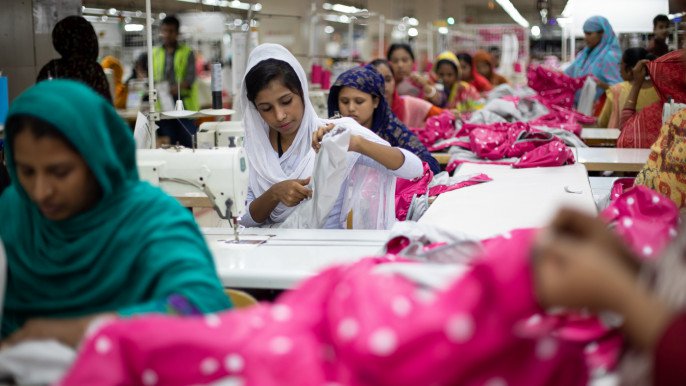Published in Dhaka Tribune on February 27, 2018

Photo: Syed Zakir Hossain/ Dhaka Tribune
Verbal, mental and physical harassment common in workplaces
Despite being core driving force behind the RMG industry’s success, female RMG workers continues to face various problems including most of them experiencing verbal, mental, physical and sexual harassment from employers and colleagues.
Highest 84.7% of them reported experiencing verbal harassment, while 71.3% mental harassment, 20% physical harassment, 12.7% sexual harassment, and 52% experienced physical harassment from supervisors, finds a latest report.
The report titled “State of Rights Implementation of Women Ready-made Garment Workers” found that many women garment workers are not getting their rights as stipulated in the labour law of the country.
Funded by Austrian Development Cooperation, Karmojibi Nari in collaboration with the European Union and CARE Bangladesh published the report at a city hotel on Monday.
Currently, female RMG workers constitute around 55% of the 4.2 million RMG workforce in Bangladesh. However, despite having the larger share in the industry’s workforce, women workers are still plagued with various problems and are deprived of many of their rights, according to industry experts.
The RMG industry now contributes over 81 percent to Bangladesh’s export income.
The report highlighted the present status of application of labour law provisions for women workers in the areas of employment contract, working hour, rest and leave, work environment, welfare and social protection, and workplace representation. The report also focused on the state of women garment workers’ issues for example sexual and reproductive health and career prospect.
According to the report that surveyed a total of 150 workers from knit, woven, and composite factories, violation of rights provisions was found common at the workplaces of almost all workers with varied degree.
The report stated that rights provisions were not implemented fully and sometimes there are instances of partial implementation. It found that non-implementation was more frequent in areas of service book, working hour including overtime, leaves (casual, sick, annual), separate rest room, social protection like provident fund and group insurance, and representational rights.
51.3% of the workers surveyed said their employers do not provide service book, while 31.3% have no appointment letter and 24.7% do not have identity card.
Half of the total RMG workers surveyed reported working for 9-10 hours a day while rest 50% work more than 10 hours daily. 60% workers do more overtime work than the hours stipulated in the law,
70% have claimed they do not get the chance to take rest, 74.7% have the experience of doing night duty and 25.3% do not get a chance to enjoy the weekly holiday, the report states.
On the other hand, the report found that partial implementation was frequent in areas of maternity leave and day care. In the case of maternity leave many employers provided leave lesser than the required period (16 weeks), and many even provided leave without pay.
The report further found that besides the rights, many other gender specific needs of the women workers remain unmet at the workplaces.
Day care facilities are not available at the workplaces of majority workers and many workplaces do not have arrangement for breast-feeding. Moreover, in the factories that have the facilities, workers were not satisfied with the arrangements.
The findings of the report also stated that most workers do not receive special treatment during menstruation, and do not get sanitary napkin at subsidized cost. Employers do not provide long-term leave in case of pregnancy related complexities.
Furthermore, the issue of security during night work is not taken seriously, and workers are not provided with transport facility during night duty.
The report recommended strengthening the enforcement of labour law and suggested the need of active enforcement efforts from the government. It also emphasized that to gain their rights, workers need to be more aware and conscious.
Employers need to be held responsible for their workers and responsibility must be upheld for violations of rights and devising strategies for evading legal obligations. Other recommendations of the report included sensitizing employers on gender issue and ensuring workplaces with workers’ upgradation or promotion policy.
 CPD RMG Study Stitching a better future for Bangladesh
CPD RMG Study Stitching a better future for Bangladesh




